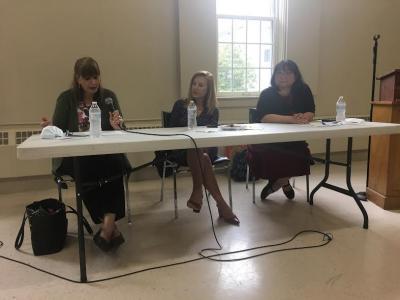Residents can lend hand, hearts to refugees, immigration experts say

MATTAPOISETT — When refugees settle into an area, displaced from their home countries and often their family and friends, they sometimes arrive with little more than the clothes on their backs.
As refugees adjust, immigration experts recommend that residents in the Tri-Town and beyond help them navigate their new lives. They discussed ways residents can provide support during a forum on immigration held Sunday, May 15 at Mattapoisett Congregational Church.
“We all have a role to play,’’ said Helena DaSilva-Hughes, president and CEO of the Immigrants Assistance Center in New Bedford.
Forty-six Afghan refugees have arrived in the Southcoast since November 2021, said Mali Lim, who works with the refugees as a team leader for the Southcoast Afghan Welcome Network.
They are living in Dartmouth, New Bedford and Taunton, she said.
Lim noted that refugees from war-torn Ukraine could also arrive in the region as soon as this summer.
The newcomers may not have many possessions with them as they approach their new lives, the experts said, but, without exception, they bring something: Questions. And a lot of them.
How do I use a checking account? Where does the local bus go? How can I learn to speak better English?
The Southcoast Afghan Welcome Network works to help answer these questions and is looking for volunteers to help this effort.
The network seeks to provide essential social, cultural and educational support to refugee households. They assist refugees integrate into the community and gain self-sufficiency and eventual citizenship.
Recently, the network launched “Friend Circles,” which relies on volunteers to provide a helping hand to refugees.
Government agencies and social programs provide some support, but that does not cover all the issues refugees face, Lim said.
“We hope the Friend Circles will fill the gap,’’ she said.
Friend Circles are organized groups of five to six volunteers willing to help refugees. Volunteers are assigned to refugee families for six months.
During that time, they provide assistance with tasks such as finding out where the closest banks, stores and food pantries are located; learning how to use the post office and ATM machines; and providing rides to places outside of public transportation routes.
Many of these refugees arrive able to speak at least some English, Lim said, which is an advantage.
And many are well-educated in their home countries: One man she works with was a professor in Afghanistan but does not speak enough English to fill a similar role here.
Another woman she knows was an obstetrician/gynecologist in Afghanistan, but faces a labyrinth of paperwork before she can have her medical credentials transferred so she can practice in the United States.
She also knows of a journalist who now works in a factory.
One step that will improve their lives, experts said, is the recent passage of a state bill that allows undocumented immigrants to obtain driver’s licenses in Massachusetts.
The panelists said having a license opens worlds of possibilities by providing easier — and sometimes the only — access to job sites and other essential locations.
This issue has been on the table for more than 30 years before its passage earlier this month, Hughes said.
Immigration issues have been a “political football’’ for many years, Hughes said, with each political party blaming the other while the ongoing challenges continue unsolved.
“They talk about it at election [time],” she said. But after the ballots are counted, “they become very silent.’’
To learn more about joining Friend Circles, email Lim at Mali.lim@newbedford-ma.gov












